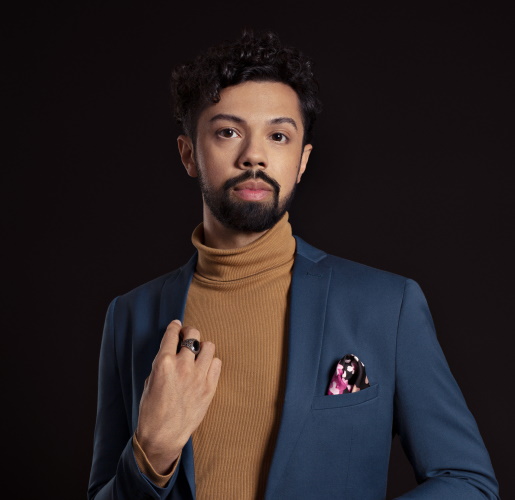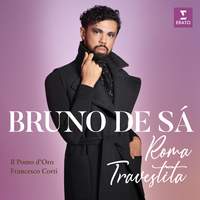Interview,
Bruno de Sá on Roma Travestita
 With a range that extends easily beyond high C, the young Brazilian sopranista Bruno de Sá is already in huge demand for roles written for the great soprano castrati of the eighteenth century, and his debut recording on Erato (released last month) explores the period in musical history where a papal ban on female performers in Rome meant that 'prima donna' roles in operas were overwhelmingly created for and by male singers in travestito.
With a range that extends easily beyond high C, the young Brazilian sopranista Bruno de Sá is already in huge demand for roles written for the great soprano castrati of the eighteenth century, and his debut recording on Erato (released last month) explores the period in musical history where a papal ban on female performers in Rome meant that 'prima donna' roles in operas were overwhelmingly created for and by male singers in travestito.
But with operatic engagements to date including Mozart's Barbarina and First Lady as well as trouser-roles such as Handel's Sesto in Giulio Cesare, he's also enjoyed great success in roles which were written for women - and which remain almost exclusively the province of female sopranos and mezzos today. While he was in Athens this summer (preparing to sing Cleofide in Vinci's Alessandro nell'Indie for Bayreuth Baroque), Bruno spoke to me about the process of 'finding his own path' as a male soprano, why he doesn't want to be pigeon-holed as a baroque specialist, and his hopes that more casting-directors and audiences will eventually be able to 'get past the gender stuff' and consider him for assignments such as Handel's Cleopatra or (in the fullness of time) even Verdi's Violetta...
How old were you when you began singing, and were you always aware that your voice was something out of the ordinary?
I’ve been singing since I was two, because I come from a very musical family – my parents met through singing in church choir as kids, and all my uncles and aunties and even my grandparents on both sides are amateur musicians. I never sang as a tenor or baritone: this is just my natural voice!
I started out as a very high treble, and of course I had some transition in my voice during my teens. I wouldn’t say my voice ‘broke’ as such, because it happened more subtly than for other guys, but I definitely experienced some instability: as my body developed it started requesting more support to access the high notes, which is something that also happens to a lot of female sopranos around the same age. When I was younger I used to sing along to the Queen of the Night's aria with no problem, but these days my high F isn't so reliable...an E flat's currently my limit in terms of what's presentable on stage!
My teenage years were a time of experimentation, really. I was still just singing in choir for fun, and I only started to have individual singing lessons when I was 22 – so quite late! When I did my first Bachelors degree I was a first-study flautist training to be a music-teacher, but then singing activities started taking up more and more of my time…eventually I got to the point where I was playing my flute in orchestra rehearsals and then not opening the case again until the next week!
So at what stage did you realise that a solo singing career was a real possibility?
I enrolled for a second Bachelors in singing, but with the aim of just becoming a better teacher rather than having a performing career. I was still singing high, of course, but I wasn't particularly attached to that as a vocal identity and my teacher treated me the same as anybody else: we just focused on basic technique, like support and breathing, and let things develop from there.
At the end of the second semester [Brazilian harpsichordist, conductor and teacher] Nicolau de Figueiredo came over from France to do a masterclass, and even though I was still a really raw, baby singer my teacher pushed me to take part. I had no idea how important Nicolau was (and thank heaven, otherwise I wouldn't have dared take part!), and I turned up and sang Caccini's Amarilla mia bella...Nicolau was at the harpsichord, and when I finished he was in floods of tears: he said he'd never heard anything like it, and he was the person who introduced me to the term 'sopranist'.
With so little precedent to draw on, how did you set about figuring out your operatic repertoire as a sopranist?
People hear a man singing high and immediately think 'Baroque'...As it's turned out, that's my main repertoire these days and it isn't that I don't enjoy it, but I didn't want to be pigeon-holed. And at that time I wasn't really connected to the early music scene in Brazil, so I thought 'Let’s find my own path!'.
I started exploring male roles performed by high mezzo or soprano, outside the Baroque period: Mozart’s Sesto, Annio and Cherubino, Romeo in Bellini’s I Capuleti, Stephano in Gounod's Roméo et Juliette, Oscar in Verdi’s Un ballo in maschera…even the Shepherd-Boy in Wagner’s Tannhäuser! But then I started questioning why I had to fit into a certain box because of my gender: no-one bats an eyelid about female singers doing the roles I just mentioned, so why can’t I sing Susanna, Adina and Norina? The job of an actor is to embody whatever character you’re portraying, and if I can get the physicality right and the costuming works, how is that any different from a mezzo playing Octavian or Cherubino?
Certainly there isn’t much precedent: male sopranos who can maintain the same vocal quality as female sopranos are really rare, and when so many great female singers are able to do the job why would anyone cast a man?! But I’d love to get to a place where casting-directors could get past the gender stuff and hire me on the basis of my musicality. I don’t want to be cast as a gimmick, or for directors to feel that they have to make an excuse for my gender: ‘Look, we’re doing Traviata, but the twist is that Violetta’s a man! How avant-garde!’. We don't do that when women sing trouser-roles, so why do it the other way round?
What was your first professional engagement in a female-presenting role?
First Lady in Die Zauberflöte! I was working at a theatre in Brazil, and was at a bit of a loose end: there'd been a change of management, and the new intendant really didn’t know what to do with me...I'd explained that I was perfectly happy singing tiny roles, but that season I had no roles at all! Anyway, Zauberflöte was coming up and they'd lost their First Lady, and because I'd done the first act in student-led opera-scenes I offered myself up. I knew the role worked in my voice, and once we started production rehearsals they simply treated me as a female character – I just shaved my beard, wore a female costume, and it was no big deal!
Do you feel that shifting attitudes towards gender-fluidity are already having a positive impact in the opera world, or is the industry lagging behind there?
That's a really complex issue and I don't want to speak over people who know much more about it than me, but one thing I've been very careful to avoid is using the wider conversations around gender-identity that are happening nowadays to sue in my favour: I would feel I was taking advantage of something that’s bigger than me, and that’s not respectful or fair. That was behind the decision to have a more subtle cover, too. I wanted to be clear that I'm a male singer who’s giving life to female roles – I don’t want to BE the travestita.
As your album illustrates, the idea of male singers portraying female characters was widely accepted in eighteenth-century Rome - did that acceptance extend beyond the stage, or were attitudes to gender in that society generally more conservative?
Because of the papal ban forbidding women to perform on stage, that society was used to seeing men in travestito - it wasn’t an issue in that specific context, although I’m not so sure that that freedom extended into the wider community.
Of course Farinelli was the most famous castrato, and one track on the recording is dedicated to him – Farinelli was a mezzo with a big range rather than a soprano, though, so dedicating a whole album to him wouldn’t have been comfortable in my voice. But the music written for Farfallino [aka Domenico Giacinto Fontana] is a great fit: he was a soprano who specialised in singing male roles (one exception being the prima donna role of Cleofide in Vinci's Alessandro nell'Indie, which I’m singing right now at Bayreuth Baroque).
Skipping forward to the present day, which contemporary singers did you particularly identify with when you were in the process of discovering your voice?
I never had a frame of reference in the way that many young singers do, and I see that as a good thing! Because there are so few of us anyway, I couldn't find another male soprano who had the same range and vocal colour as me, and I think that really helped me to forge my own identity: if you're a mezzo who really identifies with, say, Cecilia Bartoli, the risk is that you become the best copy of Bartoli rather than the artist you're truly meant to be.
But in terms of musicality and presence, I connect with singers of all voice-types: maybe it's my pedagogical background, but I try to learn something from everybody. I love Philippe Jaroussky's incredible baroque ornamentation; I love those very warm and rounded pianissimos that we hear from Freni or Caballé; I'd kill to be able to deliver raw emotion like Joyce DiDonato, or to serve cold-eyed elegance and nobility like Elīna Garanča!
What's coming up for you next season, and what are your longer-term repertoire-goals?
I’m doing Stephano in Roméo et Juliette at the Opéra de Rouen, so revisiting that high mezzo repertoire, but I’m also singing a very high soprano role in Innsbruck a bit later on – with plenty of space in between, because I’m mindful of Callas’s advice not to mix fachs too close together! Beyond that, I’ll be guided by how my voice develops, but I do have a couple of dream roles…please, someone hire me to sing Cleopatra! I’d love to sing Donizetti’s Adina and Norina, more Mozart roles (maybe Donna Elvira, definitely Fiordiligi), then eventually let’s say Lucia and ultimately Violetta. That would be my dream journey – the same journey as many other lyric leggiero sopranos.
But in the meantime I’m open to any offers...I learn something with every role that I do, whether it’s big or small, and even when you return to a part you’ve already sung a lot there’s always something new to learn. That’s my only disappointment with the Baroque world: because new discoveries and new editions are coming so thick and fast right now, you rarely get to return to something in a different production and really get under the skin of the character. I’m so envious when I hear singers say 'Oh, this is my hundredth Violetta/Rodolfo/Carmen'!
Bruno de Sá (sopranist), Il Pomo d’Oro, Francesco Corti
Available Formats: CD, MP3, FLAC, Hi-Res FLAC



